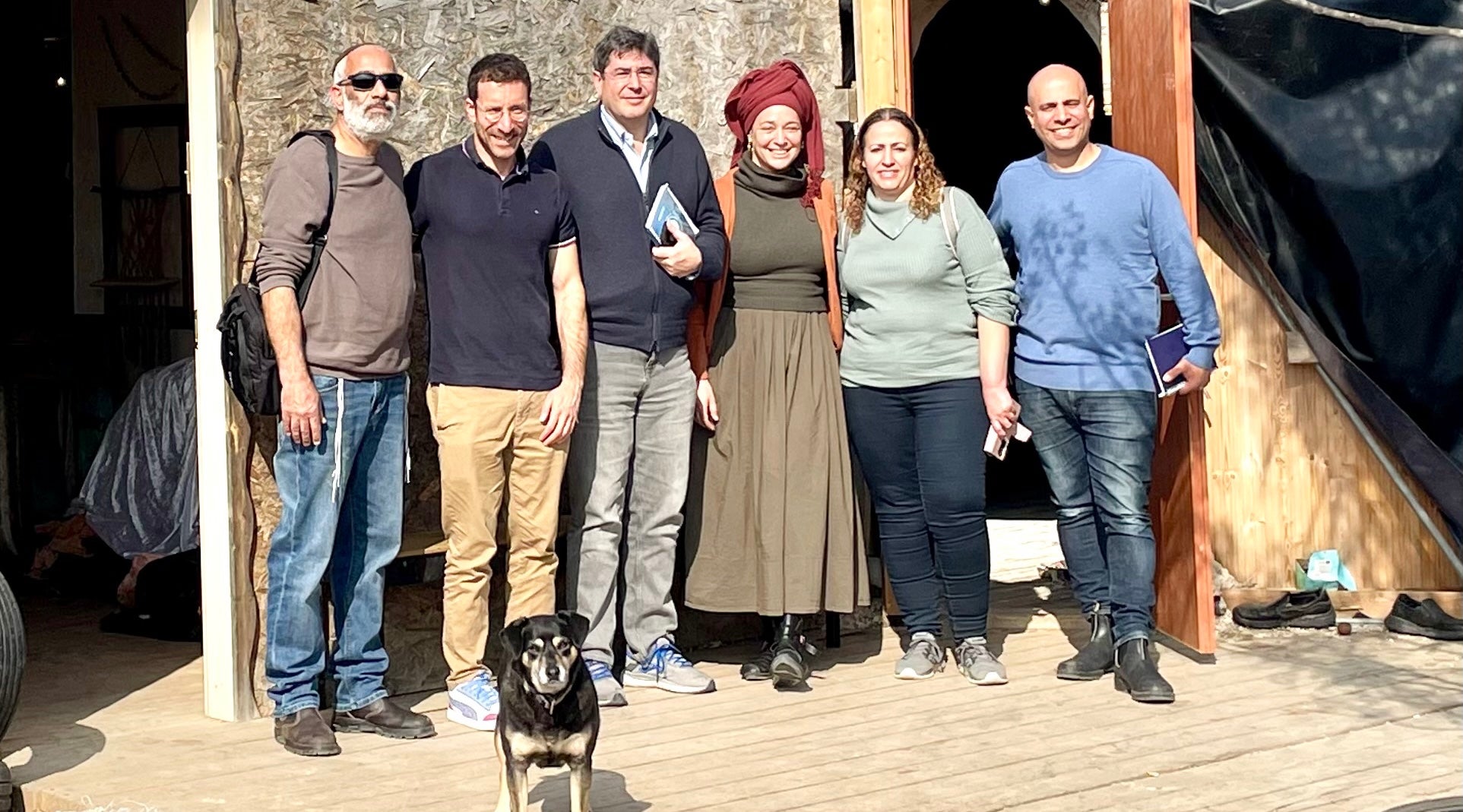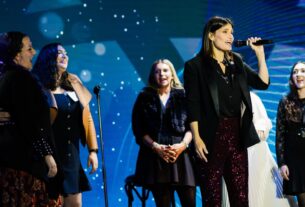KIBBUTZ EREZ, Israel — Under the shade of a large tree on Kibbutz Erez less than a mile from the Gaza Strip, half a dozen Israeli children play history trivia games with a counselor.
When loud booms from Gaza echo across the sky, some of the kids flinch at the noise.
It’s a reminder of the omnipresence of war and the horrors of Oct. 7, 2023, in this community of 560, where on that deadly day one kibbutz member was killed and four were injured. For months afterward, the kibbutz was empty, its residents internally displaced and sheltering elsewhere amid the war between Hamas and Israel.
While in recent months members of Kibbutz Erez and most of the other Israeli communities near Gaza have returned to their homes, the area’s rehabilitation needs remain vast. The hardest-hit kibbutzim and towns require massive reconstruction; many homes and infrastructure in the area require extensive repairs, and residents remain deeply traumatized.
The war, of course, has yet to end.
“A lot of people are still suffering from trauma,” said Shay Ilan, co-founder of the nonprofit group Totzeret Ha’Aretz, “not only from the event itself — the fact that a terrorist was inside your home — but after you’ve evacuated for a long time and the community is scattered all over Israel, that’s traumatic too.”
American Jews are helping the effort to rebuild and rehabilitate the area through Project Horizon, a $17 million program initiated by UJA-Federation of New York along with $4.4 million from Combined Jewish Philanthropies of Greater Boston and $1 million from the Jewish Federation of Greater Washington, D.C.
The idea is to focus on four areas of assistance — community resilience, trauma care, informal education and employment — for the 30,000 or so residents in 53 Israeli communities near Gaza.
“We understood there was a big gap between immediate needs and long-term recovery,” said Gabriel Sod, the Israel-based director of government relations for UJA. “For these communities to even have the opportunity to recover, we knew we’d need to assist them in this interim stage for the next 12 to 18 months. The government was helping them rebuild, but no one was holding these communities together.”
“We moved quickly in the early days to meet urgent needs,” said Eric S. Goldstein, CEO of UJA-Federation of New York. “Now we’re focused on the future and reimagining what’s possible. Project Horizon is about fulfilling our promise to walk with the communities, not just through crisis but in healing and rebuilding better.”
Launched in March 2024, Project Horizon began by awarding $8 million to the eight communities that suffered most in the Hamas attack: Be’eri, Holit, Kfar Aza, Kissufim, Nahal Oz, Netiv Ha’Asara, Nirim and Nir Oz. On the ground, the project is coordinated by the Israeli organization Totzeret Ha’aretz (Hebrew for “Made in Israel”), which seeks to strengthen Israeli society by sending young people to live in peripheral communities like those near Gaza.
In the second stage, Project Horizon distributed $4 million in grants toward Erez and 11 other communities within about 4 miles of Gaza. Now Project Horizon is expanding the aid with $5 million more to an additional 33 communities near Gaza.
Project Horizon is part of the more than $200 million UJA-Federation has allocated in Israel since Oct. 7.
“Because we have a full team in Israel and real grasp of what’s going on in the field, we were able to act quickly and on a large scale, which very few funders in Israel were able to do,” Sod said. “Before we launched Project Horizon, we spent five months working with the communities. We went to the hotels where these people were evacuated and just listened to what they had to say. We encountered communities that didn’t have leadership, because in some cases the leaders had been killed or kidnapped.”
Children in outdoor games at Kibbutz Erez, one of the Israeli border communities near Gaza. (Larry Luxner)
Through a partnership with Israel’s Business Alliance, UJA-Federation enlisted the help of large companies like Wix, Viola, Cisco and Tidhar, which assisted residents of affected kibbutzim and towns to move to interim housing and, in some instances, to restructure their debt and raise funds. UJA-Federation also helped hire community managers to help residents figure out how to rebuild, create community resilience and trauma frameworks, and sometimes create the whole community infrastructure.
Before the war, Dor Zohar, a lifelong resident of Erez, helped manage a Tel Aviv high-tech firm.
“Even though there were no hostages from Erez, it’s the same area and all of us know people who were kidnapped,” said Zohar, 35, tearing up recalling twins Gali and Ziv Berman — close friends of his younger brother — who were dragged into Gaza from nearby Kfar Aza. “After what happened on Oct. 7, I realized that I couldn’t just go back to a normal job making money for someone else. I understood that there was a vacuum of leadership at Erez.”
Zohar is now the partnership manager for Kibbutz Erez, overseeing how the kibbutz allocates the funds received through Project Horizon. The money has funded after-school activities, student trips, special events and the salaries of kindergarten coordinators.
“A lot of people who want to help think they know what’s best for you,” Zohar said. “What’s unique about Project Horizon is they didn’t tell us what we need. They sat with us and listened. And they helped us build an education plan that we couldn’t have done with our own resources.”
Yanir Yagel is the project’s partnership manager at nearby Dekel, an Israeli town that has also received support from Project Horizon. Among Dekel’s attractions is a small museum dedicated to the history of Yamit, an Israeli settlement in the Sinai Peninsula that was evacuated more than 40 years ago after Israel and Egypt signed a peace accord returning Sinai to Egyptian control. Dekel was founded by many of those evacuees.
“One of my projects is to do a movie on what happened in the area” on Oct. 7, said Yagel, 35, who before the current war worked as a tour guide. “I also want to take this money and build a coffeehouse to be located near the museum, so young people can learn how to start a business with their own hands.”
At Netiv Ha’Asara, where 20 people were killed on Oct. 7, Project Horizon’s grant focuses on community resilience. This includes replacing damaged trees, erecting new signage for families’ homes, a surfing program that offered a therapeutic outlet for 90 children, a five-day trip to Eilat for 20 high school students, a women’s day retreat for 20 community leaders and a local Purim celebration.
The prolonged trauma has increased demand for mental health services and resilience programs, especially for children under 12, and many residents of Netiv Ha’Asara still haven’t returned home.
Community leaders from the town recently wrote a letter of thanks to UJA.
“We want to express our heartfelt gratitude for Project Horizon’s support,” they wrote, saying it “helped us restore our daily routines, deepened our communal bonds and enhanced the well-being of our entire community.”
Keep Jewish Stories in Focus.
(JEWISH REVIEW) has documented Jewish history in real-time for over a century. Keep our journalism strong by joining us in supporting independent, award-winning reporting.




